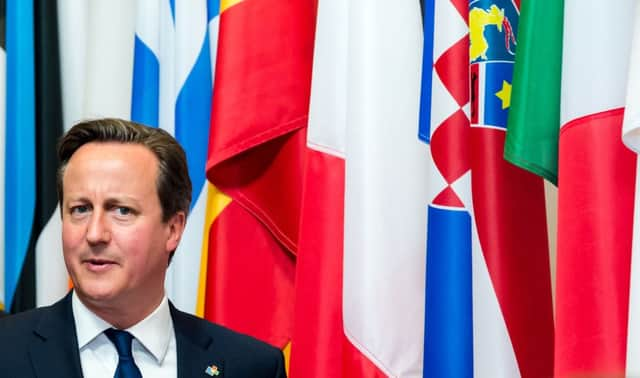Cameron’s EU renegotiation bid runs into opposition


The heads of government from Belgium, Romania, Spain and Finland have all told Mr Cameron that they oppose his demands of changing the rights of EU citizens in member countries, particularly his desire to ban them from claiming in-work benefits for the first four years.
The opposition from EU governments, who have to unanimously agree to changes, means that Mr Cameron’s hopes of having a significant renegotiation have been hit and could lead to a UK exit.
Advertisement
Hide AdAdvertisement
Hide AdTory backbenchers have made it clear that they believe the prime minister needs to come back with major changes to the EU membership terms or the Prime Minister should push for a so called Brexit (British exit).
The Prime Minister has already run into problems after he was forced to pull back from banning ministers from negotiating in favour of leaving the EU.
He said he has not ruled out campaigning to leave the EU if he cannot secure good enough terms. He has also said he wants the UK to stay in the EU.
Belgium’s prime minister Charles Michel, led the way in suggesting that Mr Cameron will not get what he wants from the negotiations. He described the banning of EU migrants having in-work benefits for four years as “a non-starter”.
Mr Michel added: “I can’t rule anything out. But it is the British who have pushed the referendum button. It’s democracy and no-one in Europe argues with that. I recognise that, on Europe, British public opinion sees things differently to ours.
“But if the British think that it is possible for them to enjoy only the advantages of EU membership while the drawbacks are only for the rest; that will not work.”
Asked if he would accept Romanians not getting in-work benefits in the UK, Romanian president Klaus Werner Iohannis said: “Well, obviously not, because it’s my best interest to have Romanians treated as European citizens everywhere in the European Union.” He added: “No member state is allowed to treat people coming from elsewhere differently from its own people.”
Finnish prime minister Juha Sipila and Spanish prime minister Mariano Rajoy said they would not consider changing EU treaties. A spokesman for Mr Rajoy said that he told Mr Cameron: “It can’t be done.”
Advertisement
Hide AdAdvertisement
Hide AdBut Downing Street tried to play down the problems yesterday. Mr Cameron’s spokeswoman said: “You are going to hear lots of views expressed during this process.
“What matters is the Prime Minister is absolutely committed to addressing the concerns of the British people and to working with other leaders to find a solution.”